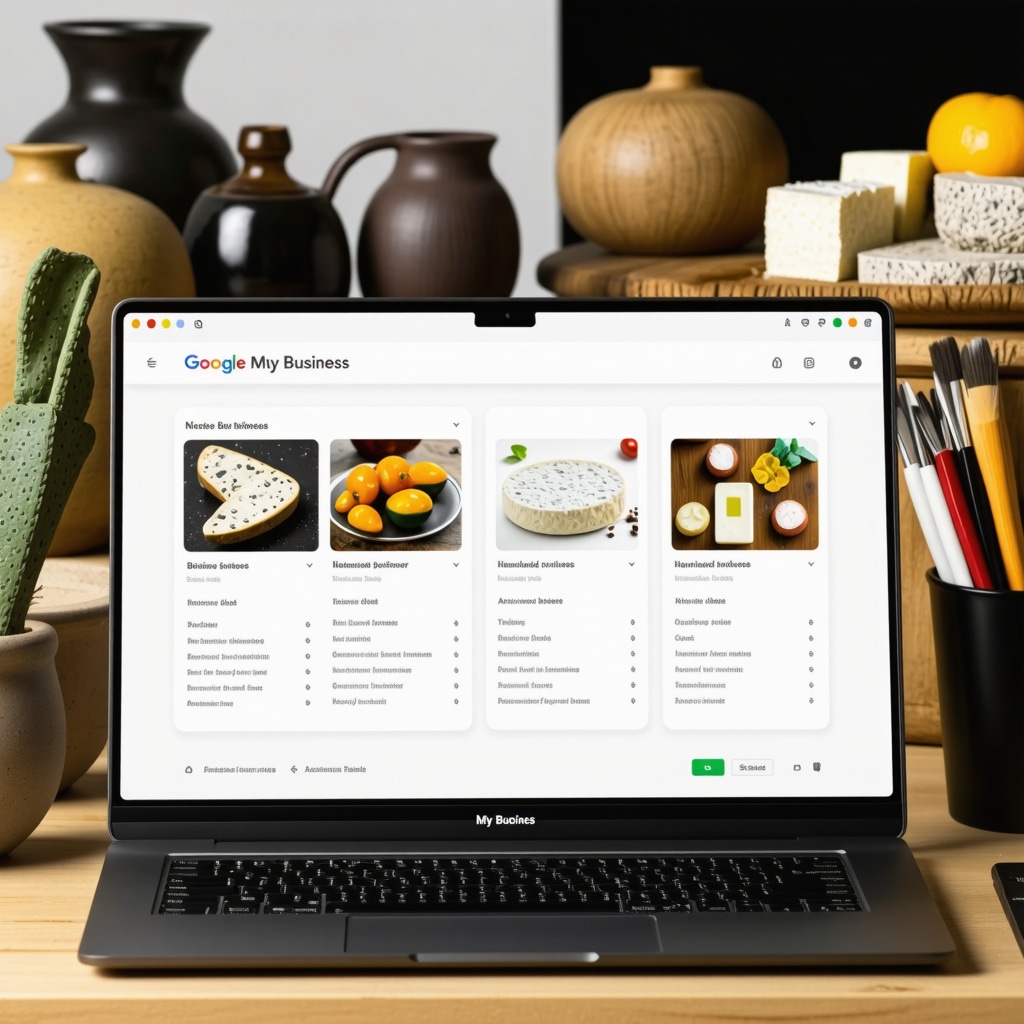Discovering Hidden Gems: Keyword Research Tailored for Niche Businesses on Google My Business
In the vast digital landscape, niche businesses often struggle to surface in local search results dominated by broader industries. Google My Business (GMB) keyword research is a specialized craft that, when executed with precision, can catapult a niche business into the spotlight, driving highly targeted local traffic and meaningful customer engagement. This guide unveils expert strategies to unearth the precise keywords that resonate with your unique market segment, leveraging GMB’s potential to its fullest.
Mining Micro-Moments: How to Identify Hyper-Local and Intent-Driven Keywords
Niche businesses thrive on connecting with customers who have very specific needs or interests. The key lies in identifying hyper-local and intent-driven keywords that reflect the exact services or products your business offers within your community. Using tools such as Google Keyword Planner, combined with GMB insights, you can pinpoint long-tail keywords that integrate location modifiers (e.g., “organic pet food store in Brooklyn”) and buyer intent phrases (like “best gluten-free bakery near me”). This strategic alignment ensures your GMB listing appears precisely when potential clients are ready to act, not just browse.
Leveraging Semantic SEO: Beyond Exact Match Keywords in GMB Optimization
Modern SEO demands a semantic approach—understanding the contextual relationships between keywords rather than relying solely on exact matches. For niche businesses, this means incorporating latent semantic indexing (LSI) keywords that enrich your GMB profile content, reviews, and posts. For example, a boutique vintage watch seller might include terms like “luxury timepieces,” “collectible watches,” and “horology experts” to capture a wider yet relevant audience. This technique not only enhances your local search relevance but also aligns with Google’s evolving search algorithms that prioritize user intent and content depth.
How Can Niche Businesses Master GMB Keyword Research to Outrank Competitors Locally?
To outperform competitors in local pack results, niche businesses must blend detailed customer persona research with data-driven keyword analysis. Start by mapping customer questions and local vernacular, then validate these through GMB’s search queries data and third-party SEO tools. Integrate these findings into your business description, services, and regularly updated posts. Additionally, monitor competitor GMB listings to identify keyword gaps and emerging trends. This dynamic process, combined with consistent GMB profile optimization, positions your niche business as the definitive local authority.
For an in-depth methodology on enhancing your Google Business Profile, explore our comprehensive guide to optimizing Google Business listings effectively.
The Power of Practical Application: Real-World Case Study
Consider a small, family-owned artisanal cheese shop in Portland. By targeting keywords such as “handcrafted goat cheese Portland” and “local farmstead cheese near me,” they increased their Google Maps visibility significantly within months. They enriched their GMB profile with detailed descriptions, locally relevant keywords, and customer reviews that echoed these terms, resulting in a 40% increase in foot traffic. This example underscores the transformative impact of precise GMB keyword research tailored to niche audiences.
Stay ahead in the competitive local SEO arena by harnessing specialized strategies like those detailed in our GMB keyword research techniques article.
Engage With Us: Your Turn to Unlock Local SEO Success
Have you experimented with GMB keyword research for your niche business? Share your experiences or questions in the comments below — your insights could inspire others on their local SEO journey!
For further expert advice and actionable tips, visit Search Engine Journal’s authoritative guide on Google My Business, a trusted resource renowned for its in-depth SEO industry expertise.
Integrating Voice Search Optimization into GMB Keyword Research
With the rise of voice-activated assistants, optimizing your Google My Business profile for voice search queries has become essential, especially for niche businesses. Voice searches tend to be more conversational and question-based, such as “Where can I find authentic handmade chocolates near me?” or “Best eco-friendly yoga studios in San Diego.” Incorporating natural language and question phrases into your GMB content and posts can help capture this growing segment of local search traffic.
Use tools that analyze voice search trends and include FAQ-style posts on your GMB profile to address common customer queries. This approach not only enhances your profile’s relevance but also aligns with Google’s intent to deliver precise answers quickly.
Harnessing the Power of Visual Content Keywords in GMB Optimization
Images and videos play a critical role in engaging local audiences and improving your Google Business Profile’s ranking. Beyond standard keyword research, consider optimizing your visual content with descriptive, keyword-rich file names, alt text, and captions that incorporate your targeted niche keywords.
For example, a boutique pottery studio might upload images titled “handmade-ceramic-mugs-Brooklyn” and include captions like “Unique handcrafted ceramic mugs available in Brooklyn.” This semantic enrichment boosts your profile’s authority and helps Google associate your business with relevant search terms, driving more qualified leads.
What Are the Most Effective Ways to Monitor and Adapt GMB Keyword Strategies Over Time?
Continuous monitoring and adaptation are pivotal for maintaining a competitive edge in local search rankings. Experts recommend leveraging GMB Insights in conjunction with advanced SEO tools like SEMrush or Ahrefs to track keyword performance, user queries, and competitor movements.
Regularly analyze which keywords are driving traffic and conversions, and adjust your GMB content accordingly. Seasonal trends, emerging local events, or shifts in consumer behavior necessitate periodic updates to your keyword strategy to sustain visibility and engagement.
Additionally, engaging with customer reviews provides invaluable feedback on keyword relevance and emerging search terms. Responding thoughtfully to reviews and incorporating frequent phrases into your profile content can amplify your local SEO impact.
To deepen your understanding of effective GMB ranking tactics, refer to our detailed guide on effective GMB ranking strategies to elevate your business.
Expert-Endorsed Tools for Advanced GMB Keyword Research
While Google Keyword Planner remains foundational, integrating specialized tools such as BrightLocal, Moz Local, and Whitespark can provide nuanced insights tailored for local SEO success. These platforms offer citation tracking, local ranking reports, and competitor analysis that refine your keyword targeting and citation management.
Moreover, Google Trends can reveal rising local search interests, facilitating timely content updates and promotional campaigns aligned with current demand.
According to a comprehensive study by Moz on Local SEO Ranking Factors 2023, businesses that actively manage their GMB profiles with strategic keyword integration and citation consistency witness up to 30% higher local search visibility.
Embracing these expert tools and insights ensures your niche business remains agile and authoritative in the dynamic local SEO landscape.
Explore our resource on expert GMB citation services for enhanced rankings to further bolster your profile’s local authority.
Dynamic Adaptation: Evolving Your GMB Keyword Strategy for Long-Term Dominance
In the rapidly shifting realm of local SEO, static keyword strategies can quickly become obsolete. Niche businesses must embrace a dynamic approach to Google My Business keyword research, continuously refining their tactics to maintain and enhance local search prominence. This requires not only monitoring performance metrics but also anticipating changes in consumer behavior, seasonal trends, and emerging industry jargon.
For instance, a boutique eco-friendly yoga studio might notice a rise in queries related to “virtual outdoor yoga classes” during colder months. By integrating such timely, intent-rich keywords into their GMB posts and Q&A sections, they align their profile with current user needs, boosting relevance and engagement.
Leveraging tools like Google Analytics alongside GMB Insights provides a comprehensive view of traffic sources and user interactions, enabling precision tuning of keyword focus areas. Regular audits of keyword rankings and competitor shifts should inform iterative content updates, ensuring your niche business remains a local leader rather than a follower.
Can Seasonal and Event-Driven Keywords Significantly Impact GMB Performance for Niche Markets?
The short answer is a resounding yes. Seasonal and event-driven keywords serve as catalysts for localized spikes in search volume, especially for niche businesses tied to community events or seasonal demand. By proactively incorporating these keywords, businesses can capitalize on heightened interest periods, outperforming competitors who maintain a static keyword repertoire.
A practical example comes from a family-owned artisanal cheese shop in Portland, which saw a 25% increase in online inquiries during the holiday season by targeting keywords like “holiday gift cheese baskets Portland” and “seasonal farmstead cheese specials.” This targeted approach not only increased immediate sales but also cultivated lasting customer loyalty through relevant engagement.
For a deeper dive into optimizing your GMB profile with event-driven keyword strategies, consider resources such as Search Engine Land’s guide on Seasonal SEO, which offers nuanced insights from industry experts.
Visual SEO Mastery: Enhancing GMB Listings with Keyword-Rich Multimedia Assets
Visual content is not just an aesthetic addition; it’s a strategic asset that influences local search rankings and user engagement. Incorporating keyword-optimized images and videos into your GMB profile requires a sophisticated understanding of how Google parses multimedia metadata to associate content relevance.
Beyond basic file naming conventions, advanced practices include embedding keywords within image EXIF data and utilizing schema markup for multimedia content where applicable. This semantic layering sends stronger signals to Google’s algorithms, reinforcing your niche business’s association with targeted search queries.
For example, a boutique pottery studio that meticulously tags its images with keywords like “hand-thrown ceramic bowls Brooklyn” and supplements these visuals with geo-tagged metadata can significantly elevate their local search footprint. Such nuanced optimization also enhances user experience, as prospective customers find richly descriptive images reflecting their specific needs.

How Does Semantic Enrichment of Visual Content Influence Google My Business Ranking Algorithms?
Semantic enrichment involves adding meaningful, contextually relevant metadata to your visual content, extending beyond mere keyword inclusion to convey comprehensive information about the asset. This practice facilitates advanced content understanding by search engines, effectively boosting your GMB profile’s authority and relevance.
Google’s machine learning models increasingly interpret multimedia content in sophisticated ways, favoring listings that provide rich, semantically annotated visuals. Incorporating alt text that captures nuanced keyword variations and leveraging captions that address user intent can significantly improve click-through rates and engagement metrics.
Industry research underscores the correlation between optimized visual content and higher local pack rankings, making semantic enrichment a must-have tactic for niche businesses aiming to dominate their local search environment.
To stay at the forefront of GMB visual optimization, explore expert methodologies detailed in Moz’s comprehensive guide to Visual SEO Best Practices.
CTA: Elevate Your Niche Business GMB Strategy Today
Ready to transform your Google My Business profile into an unstoppable local SEO powerhouse? Dive deeper into advanced keyword research, visual SEO, and adaptive strategies by subscribing to our expert newsletter. Empower your niche business with the insights and tools necessary to outshine competitors and captivate your ideal customers in every local search.
Harnessing AI-Powered Insights for Precision Keyword Targeting
In the evolving landscape of local SEO, artificial intelligence tools have become indispensable for niche businesses aiming to refine their Google My Business keyword strategies. Leveraging AI-driven platforms enables real-time analysis of consumer search patterns and semantic keyword relationships, uncovering nuanced opportunities beyond traditional research methods. These insights facilitate granular segmentation of local intent-driven queries, allowing businesses to craft GMB content that resonates authentically with hyper-targeted customer personas.
Integrating Behavioral Analytics to Predict and Capture Micro-Moment Searches
Understanding user behavior at the micro-moment level is a sophisticated approach for niche businesses to anticipate customer needs precisely when they arise. By analyzing behavioral signals such as click-through rates, dwell time, and repeat search patterns from GMB Insights combined with advanced analytics tools, businesses can identify subtle shifts in local search intent. This predictive capability allows for the timely adjustment of keyword focus, ensuring that GMB profiles remain aligned with evolving consumer expectations and seasonal dynamics.
What Advanced Metrics Should Experts Track to Optimize GMB Keyword Performance Continuously?
Beyond basic impressions and click data, experts should monitor metrics such as conversion attribution from GMB actions, user engagement with posts and Q&A interactions, and local competitor keyword volatility. Utilizing comprehensive tools like BrightLocal’s Local Search Audit or SEMrush’s Position Tracking with geo-specific filters provides deep visibility into keyword movement and profile health. Furthermore, incorporating sentiment analysis from customer reviews reveals emerging keyword themes and potential gaps in service descriptions.
For an authoritative framework on leveraging these advanced metrics, consult BrightLocal’s expert guide on advanced GMB analytics, which offers actionable strategies tailored for local SEO professionals.
The Synergy of Structured Data and Keyword Optimization in GMB Profiles
Implementing structured data markup on websites linked to GMB listings enhances the semantic context Google associates with your business. Schema types such as LocalBusiness, Product, and Service schema provide enriched metadata that complements your GMB keyword strategy and improves content discoverability. For niche businesses, precise schema implementation can signal relevance for specific local queries, amplifying profile prominence in competitive markets.
Moreover, integrating structured data with keyword-optimized GMB posts and descriptions creates a cohesive ecosystem that reinforces search intent alignment and elevates search engine trust signals.
Elevating GMB Profiles through Multilingual Keyword Strategies
In culturally diverse regions, niche businesses can gain a competitive edge by incorporating multilingual keywords within their GMB profiles. Optimizing for multiple languages involves localizing keyword research to reflect vernacular search terms and cultural nuances, which can significantly expand reach within underserved community segments. This approach requires meticulous content adaptation in business descriptions, services, and posts, ensuring linguistic accuracy and contextual relevance.
Such multilingual optimization not only increases visibility but also fosters inclusive engagement, positioning niche businesses as authentic local authorities across language barriers.
CTA: Transform Your Google My Business Presence with Cutting-Edge Expertise
Embark on a journey to master sophisticated GMB keyword research and visual SEO techniques tailored for niche markets. Subscribe to our advanced local SEO newsletter and gain exclusive access to AI-powered strategies, behavioral analytics insights, and multilingual optimization tactics that will propel your business beyond traditional boundaries. Unlock the full potential of your Google My Business profile today and lead your local niche with unparalleled authority.
Frequently Asked Questions (FAQ)
What is the importance of keyword research specifically for Google My Business in niche markets?
Keyword research for Google My Business (GMB) in niche markets is critical because it helps businesses identify highly specific, intent-driven search terms that potential local customers use. Unlike broad SEO, GMB keyword research focuses on hyper-local, context-rich queries that directly influence local pack rankings and visibility. This ensures niche businesses appear prominently when customers are ready to engage, driving qualified traffic and improving conversion rates.
How can niche businesses identify effective long-tail and intent-driven keywords for their GMB profiles?
Effective long-tail keywords are discovered by combining local modifiers (city, neighborhood) with precise product or service descriptors reflecting customer intent. Tools like Google Keyword Planner, GMB Insights, and third-party platforms (BrightLocal, Moz Local) help uncover these terms. Additionally, analyzing customer questions, reviews, and competitor listings reveals natural language and vernacular search patterns that enrich keyword targeting.
What role does semantic SEO play in optimizing a Google My Business profile?
Semantic SEO expands beyond exact keyword matches by incorporating related concepts and latent semantic indexing (LSI) terms. For GMB, this means embedding contextually relevant phrases in business descriptions, posts, and reviews that help Google understand the broader relevance of your profile. This approach aligns with Google’s evolving algorithms prioritizing user intent and content depth, boosting your local search authority and ranking consistency.
How can businesses leverage voice search optimization within their GMB keyword strategy?
Voice search queries are typically conversational and question-based. Incorporating natural language, question phrases, and FAQ-style content into your GMB profile and posts helps capture voice search traffic. Tools analyzing voice trends guide keyword selection, allowing businesses to target queries like “Where can I find…” or “Best [service] near me,” thus expanding visibility to users relying on voice assistants.
What advanced tools are recommended for continuous monitoring and adaptation of GMB keyword strategies?
Experts recommend a combination of GMB Insights and advanced SEO platforms such as SEMrush, Ahrefs, BrightLocal, Moz Local, and Whitespark. These tools provide granular data on keyword performance, user engagement, local ranking fluctuations, and competitor analysis. Sentiment analysis of reviews also uncovers emerging search terms and customer preferences, informing dynamic keyword updates for sustained local SEO success.
How does visual content optimization impact GMB ranking and engagement?
Visual SEO involves optimizing images and videos with keyword-rich filenames, alt text, captions, and metadata like EXIF data and geo-tags. This semantic enrichment allows Google to better associate your multimedia assets with relevant search queries. Enhanced visual content increases profile authority, user engagement, and click-through rates, which are key factors in GMB ranking algorithms.
Can seasonal and event-driven keywords significantly influence local search performance?
Absolutely. Seasonal and event-driven keywords trigger localized search spikes tied to holidays, community events, or seasonal demand. By proactively integrating these keywords into GMB posts and descriptions, businesses capitalize on timely interest and outperform competitors who maintain static keyword sets. This strategy also fosters stronger customer relationships through relevant and timely engagement.
What benefits does integrating structured data markup provide in conjunction with GMB keyword optimization?
Structured data markup (schema) enhances Google’s understanding of your business by providing explicit metadata about your services, products, and location. When combined with keyword-optimized GMB content, it creates a coherent semantic ecosystem that improves search intent alignment, boosts trust signals, and elevates your profile’s visibility in local search results.
How can multilingual keyword strategies enhance GMB visibility for niche businesses?
In multilingual or culturally diverse regions, incorporating localized keywords in multiple languages broadens your audience reach and inclusivity. Proper localization of business descriptions, services, and posts ensures relevance across language barriers, increasing visibility and engagement among underserved communities. This positions your niche business as an authentic local authority within diverse market segments.
What key performance metrics should experts track to ensure effective GMB keyword strategy adjustments?
Beyond impressions and clicks, experts should track conversion actions (calls, directions), engagement with posts and Q&A, local competitor keyword volatility, and sentiment analysis from customer reviews. Utilizing tools with geo-specific filters and audit capabilities enables detailed tracking of keyword effectiveness and profile health, guiding informed, data-driven optimizations.
Trusted External Sources
- BrightLocal (https://www.brightlocal.com): Offers comprehensive resources and tools for local SEO analytics, GMB performance tracking, and advanced keyword research tailored to local businesses.
- Moz Local (https://moz.com/local): Provides authoritative insights on local search ranking factors, citation management, and semantic SEO strategies crucial for optimizing GMB profiles.
- Search Engine Journal – Google My Business Section (https://www.searchenginejournal.com/local-seo/google-my-business/): A leading publication delivering expert articles, case studies, and up-to-date SEO industry trends specific to Google My Business optimization.
- Search Engine Land – Seasonal SEO Guide (https://searchengineland.com/seasonal-seo-how-to-capture-more-winter-search-traffic-408342): Focused on leveraging seasonal and event-driven keywords to maximize local search visibility during peak demand periods.
- Moz Blog – Visual SEO Best Practices (https://moz.com/blog/visual-seo-best-practices): Offers in-depth guidance on optimizing multimedia content with semantic enrichment to boost local search rankings and engagement.
Conclusion
Mastering Google My Business keyword research is pivotal for niche businesses aiming to dominate local search landscapes. By focusing on hyper-local, intent-rich keywords, leveraging semantic SEO, and integrating emerging trends such as voice search and seasonal targeting, businesses can significantly enhance their GMB profiles’ relevance and authority. Incorporating visual SEO best practices and structured data further amplifies their competitive edge, while continuous monitoring with advanced tools ensures strategies stay agile and effective.
Multilingual optimization and behavioral analytics allow niche businesses to resonate authentically with diverse and evolving customer bases, securing sustainable local dominance. This comprehensive, expert-driven approach transforms GMB from a simple listing into a dynamic, powerful asset that drives qualified traffic, engagement, and growth.
Empower your niche business today by applying these advanced GMB keyword research techniques and optimization strategies. Share your success stories, explore related expert content, and join the conversation to elevate your local SEO journey to new heights.




The article’s emphasis on hyper-local and intent-driven keywords really resonated with me, especially the idea of combining location modifiers with buyer intent phrases. In my experience managing a local artisanal bakery, pinpointing very specific search terms that reflect both what we offer and where we’ve situated ourselves was a game changer. For instance, targeting keywords like “gluten-free sourdough in Portland” not only increased our map visibility but also attracted genuinely interested customers who converted well. I also appreciate the focus on semantic SEO — expanding beyond exact match keywords to include related terms has made our GMB content richer and more contextually relevant, aligning with how Google interprets search intent nowadays. One challenge I’ve faced is staying agile with keyword strategies as local trends shift seasonally or due to community events. Continuous monitoring through GMB Insights and SEO tools has helped, but it requires ongoing effort. I’m curious how others balance the resource demands of such detailed keyword research and profile updates with day-to-day operations, especially for small niche businesses? Are there streamlined approaches or tool combinations you’ve found effective in maintaining an adaptive yet manageable GMB keyword strategy?
I really appreciate the emphasis on semantic SEO and visual content optimization in this article. In my experience managing a boutique fitness studio, incorporating long-tail, intent-driven keywords into our GMB profile has significantly improved our local visibility. I’ve also started integrating geo-tagged images and detailed captions, which Google seems to favor more lately, especially with the rise of visual-based searches. One thing I’ve noticed is that regularly updating multimedia assets with keyword-rich descriptions not only enhances search relevance but also keeps our profile fresh and engaging. Regarding voice search, I’ve been experimenting with FAQ sections that mirror natural conversational queries often used by clients, and the response has been promising. Has anyone here had success with integrating these voice-specific keywords into their GMB profiles? I’d love to hear what kind of strategies worked best for others, especially in highly competitive local markets.